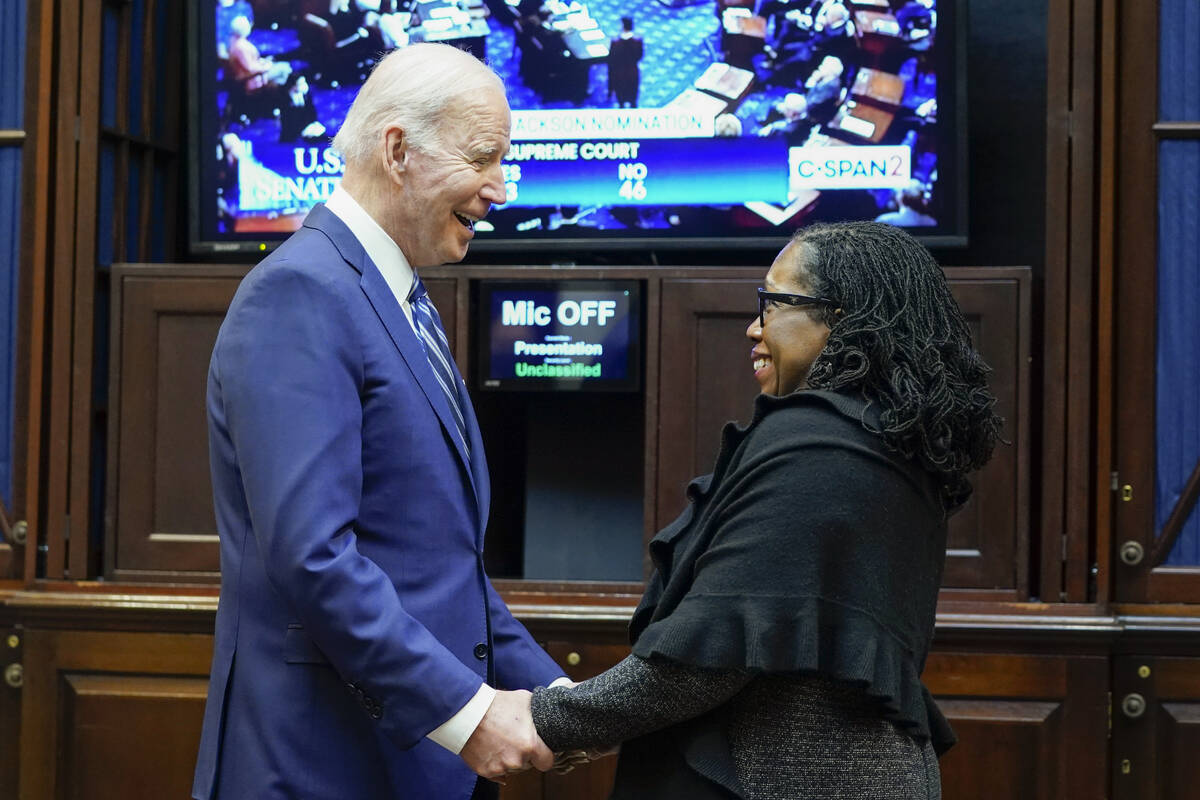White House celebrates new Supreme Court justice

WASHINGTON – An emotional Ketanji Brown Jackson used a White House ceremony Friday to thank President Joe Biden, Vice President Kamala Harris and the Senate for her historic confirmation as the first Black woman on the Supreme Court.
“It has taken 232 years and 115 prior appointments for a Black woman to be selected to serve on the Supreme Court of the United States of America,” a tearful Jackson, 51, told hundreds gathered on the South Lawn.
“We’ve made it, all of us,” Jackson said to applause and a standing ovation from the crowd that included her mother and father.
She thanked her parents, whom she said attended racially segregated schools.
“In my own family, it took just one generation to go from segregation to the Supreme Court,” Jackson said, flanked by Biden, Harris and a backdrop of American flags.
An appellate judge with nearly a decade of experience on the federal bench, Jackson said she is the inheritor of sacrifices made by generations, including her grandparents, who got up to work each day with hope of future possibilities.
“I am the dream and hope of slaves,” she said, quoting poet Maya Angelou.
Biden said “we are going to look back and see this as a real moment of change.”
“It’s a powerful thing when people can see themselves through others,” Biden said, adding, “We needed a court that looks like America.”
Senators who voted to confirm Jackson, as well as former staff, law clerks and members of the Congressional Black Caucus, including Rep. Steven Horsford, D-Nev., attended the ceremony held on the sun-dappled South Lawn.
Biden nominated Jackson to fill the vacancy created by Justice Stephen Breyer, who announced he would step down when the current court term ends. Jackson is expected to be sworn-in when Breyer leaves in June or early July.
On Thursday, Jackson watched the 53-47 Senate vote at the White House with Biden.
Harris presided over the Senate, but her tie-breaking vote was not needed in the 50-50 Senate when three Republicans – Susan Collins of Maine, Mitt Romey of Utah and Lisa Murkowski of Alaska – voted with the Democratic caucus to confirm Jackson.
Jackson endured four days of hearings and 24 hours of questioning by the Senate Judiciary Committee before her nomination came before the full Senate for a vote.
She also met privately with senators, including Catherine Cortez Masto and Jacky Rosen, both Nevada Democrats, who touted her qualifications, temperament and the diversity she will bring to the high court.
Jackson is the third African American to serve on the Supreme Court, following Thurgood Marshall and Clarence Thomas, and the sixth woman to be appointed to the highest judicial bench. Her arrival on the bench will for the first time put four women on the court at one time.
Like other recent confirmation hearings, Jackson endured hours of questioning in a forum that served more as a platform for senators with presidential and election aspirations to pontificate or checklist talking points for future campaigns.
Biden said Jackson was the victim of “verbal abuse.”
Partisan attacks and rancorous behavior during the televised hearings have led many in both parties to call for a reform of the process. If the process remains unchanged, it could make it unlikely that a nominee can be confirmed in a Senate controlled by the opposition party.
Sen. Lindsey Graham, R-S.C., declared that as so during Jackson’s hearing. He called her a liberal activist and said “nominees like this will not make it through” in the future.
Still, Biden said Jackson emerged from the hearings with incredible character, “poise and composure.”
Jackson said she held 95 meetings with 97 senators to talk about her judicial background, rulings and experience.
“I’ve dedicated my career to public service, because I love my country,” Jackson said, accepting her “crucial but limited role” as a jurist.
“I have done my level best to stay in my lane … and rule without fear or favor,” she said.
Contact Gary Martin at gmartin@reviewjournal.com. Follow @garymartindc on Twitter.